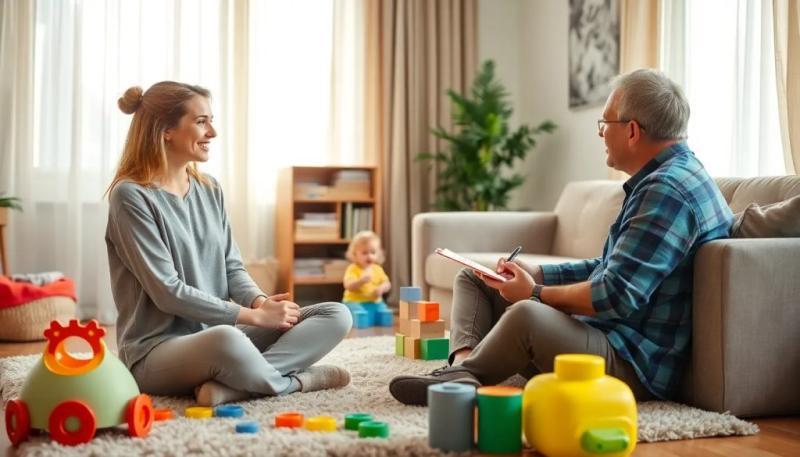Providing feedback to your babysitter is crucial for fostering a strong and productive relationship. Good communication ensures that both parties understand expectations and can work collaboratively to achieve the best outcomes for the children in their care. By mastering the art of feedback, parents can create a positive environment that benefits everyone involved.In this article, we will explore various strategies parents can use to give effective feedback to their babysitters, while also touching on the importance of handling negative feedback professionally. 
Why is babysitter feedback important?
Feedback serves as a vital tool for improving childcare practices and enhancing the overall experience for both parents and babysitters. When parents provide constructive feedback, it allows babysitters to understand their strengths and areas for improvement. This feedback loop is essential in ensuring that children receive the best care possible. Moreover, regular feedback fosters trust between parents and babysitters. When caregivers feel supported and valued, they are more likely to engage in open communication, which is crucial for addressing any issues that may arise. By creating a culture of feedback, parents can help babysitters build their confidence and competence in their roles.Additionally, feedback can help prevent misunderstandings and miscommunications that might otherwise lead to conflict. By addressing concerns promptly and tactfully, parents can maintain a positive relationship with their babysitters, which ultimately benefits the children.How can you give constructive and positive feedback?
Giving feedback in a constructive manner involves a few key strategies. Parents should aim to create a supportive environment where the babysitter feels comfortable receiving input. Here are some techniques to consider:- Use the sandwich method: Start with a positive comment, followed by constructive feedback, and end with another positive note.
- Be specific: Provide clear examples of behaviors or situations that need addressing, rather than making vague statements.
- Focus on actions, not personality: Critique specific actions rather than making personal judgments.
- Encourage questions: Allow the babysitter to ask for clarification or express their thoughts on the feedback given.
What are the common mistakes to avoid when giving feedback?
When providing feedback to babysitters, there are several common pitfalls parents should avoid:- Being overly critical: Focus on constructive criticism rather than harsh judgments, which can undermine the babysitter's confidence.
- Timing: Avoid giving feedback in the heat of the moment; choose a calm time for discussion to promote a more productive conversation.
- Neglecting positive reinforcement: Balance negative feedback with positive comments to ensure the babysitter knows what they are doing well.
- Generalizations: Steer clear of broad statements and focus on specific incidents to make feedback more actionable.
What tips and strategies can improve feedback conversations?
Improving feedback conversations takes practice and intentionality. Here are some tips to help enhance these important discussions:1. Set aside time for feedback sessions. Regularly scheduled meetings can create a safe space for open dialogue.2. Be mindful of your tone and body language. Non-verbal cues can significantly impact how feedback is received.3. Listen actively. Encourage babysitters to share their perspectives and insights, demonstrating that their opinions are valued.4. Check in regularly about ongoing performance and changes. This allows for continuous improvement rather than waiting for formal reviews.By implementing these strategies, parents can create a culture of collaboration that benefits everyone involved in the childcare experience.What are the best practices for providing feedback to babysitters?
To ensure that feedback is effective, consider these best practices:- Document specific incidents: Keep track of situations where feedback is required. This documentation will provide clarity when discussing performance.- Encourage a growth mindset: Frame feedback as an opportunity for growth rather than as criticism. This encourages babysitters to embrace challenges.- Be respectful and empathetic: Approach conversations with understanding, recognizing that everyone makes mistakes and has room for improvement.- Follow up on improvements: After providing feedback, check in to see how the babysitter has implemented changes and to offer continued support.Using these best practices will create a nurturing environment where babysitters feel motivated to improve and thrive.How can feedback build a collaborative relationship between parents and babysitters?
Building a collaborative relationship is essential for effective childcare. Feedback plays a crucial role in this dynamic. Here’s how:- Establishing clear expectations: When parents articulate their expectations clearly, babysitters can better align their actions with what is required.- Creating a support system: Regular feedback allows parents and babysitters to support each other, building a team-oriented approach to childcare.- Fostering trust: Open lines of communication through feedback create a trusting environment where both parties can express concerns and share successes.- Encouraging professional development: When babysitters receive constructive feedback, they are more likely to seek out opportunities for growth and improvement in their skills.By fostering collaboration through feedback, parents and babysitters can work together effectively to create a safe and nurturing environment for children.How can you make feedback a regular habit for better results?
Making feedback a habit requires commitment from both parents and babysitters. Here are some strategies to incorporate feedback regularly:- Schedule regular check-ins: Set aside time for discussions on performance, expectations, and any concerns that may arise.- Create a feedback-friendly culture: Encourage open conversations and normalize feedback as a part of the caregiving experience.- Use informal opportunities: Take advantage of everyday moments to provide feedback, making it a seamless part of communication.- Celebrate improvements: Recognize and celebrate progress to reinforce positive behaviors and motivate continued growth.By integrating feedback into regular interactions, parents can cultivate a culture of continuous improvement that benefits everyone involved.Questions related to handling feedback in babysitting
How to handle negative feedback professionally?
Handling negative feedback professionally involves several key approaches. First, it is crucial to remain calm and composed when receiving feedback. Taking a moment to process the information before responding can prevent knee-jerk reactions. Additionally, asking for specific examples can help clarify the feedback and provide context for improvement.Another important aspect is to maintain a positive attitude. Acknowledging the feedback without defensiveness demonstrates professionalism and a willingness to learn. Lastly, developing an action plan based on the feedback received can show your commitment to growth.How to deal with behavioral issues as a babysitter?
Dealing with behavioral issues as a babysitter requires a proactive and patient approach. It's essential to observe the child’s behavior carefully and identify any patterns or triggers. Setting clear expectations and boundaries can prevent many behavioral issues from escalating. Additionally, using positive reinforcement when children exhibit good behavior encourages them to repeat those actions. Consistently communicating with parents about any concerns can ensure a united front and a cohesive strategy for addressing behavioral challenges.What is the number one rule in babysitting?
The number one rule in babysitting is to ensure the safety and well-being of the children in your care. This includes being vigilant about potential hazards, supervising children at all times, and knowing emergency procedures. Furthermore, effective communication with both the children and the parents is vital. Establishing trust and rapport with the children makes them feel secure, while maintaining open lines of communication with parents ensures they are informed about their child's wellbeing.How do you handle negative feedback interview answers?
When answering questions about handling negative feedback during an interview, it's important to provide specific examples. Start by describing a situation where you received feedback, how you reacted, and what steps you took to address it. Demonstrating a growth mindset is essential; emphasize how you viewed the feedback as an opportunity to improve rather than as a personal attack. Conclude by discussing the positive outcomes that resulted from your efforts to learn and grow from the experience.En este sentido, te invitamos a ver un video que explora cómo las niñeras manejan profesionalmente la retroalimentación negativa.



